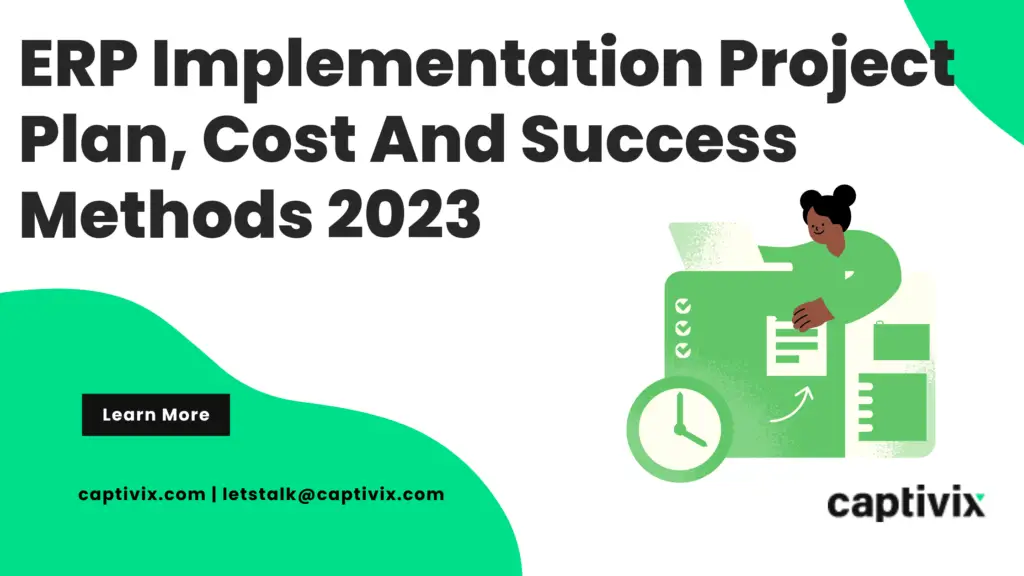ERP implementation project plan or simply, ERP project plan is a roadmap that outlines the way an ERP implementation should be carried out. Such a plan involves key steps like bringing together a project team, drafting a budget and evaluating success in the end. To be precise, an ERP implementation project plan takes into account all the crucial points which give positive results.
In the present times, one thing that most businesses are deploying at their service is ERP software. However, mere deployment of such software does not guarantee success, a fool proof plan does. This is why you need an ERP implementation project plan that works like magic for you.
In this blog we will therefore tell you about an ERP implementation project plan and how you must employ it.
What is an ERP Implementation?
ERP stands for enterprise resource planning and it refers to the process of planning, customizing and deploying your ERP system. ERP implementation is the process of implementing ERP. It helps you manage the daily activities of your business and your data and provides you with fruitful insights into it.
ERP also analyses all your information and saves your time, resources and all the extra effort that you would be using otherwise. If you carry out the entire process through the ERP implementation best practices, you will see good results flowing from it.
Benefits of ERP Implementation Project Plan
The ERP implementation best practices are important because they provide you with a single-system solution that integrates all processes across the business. Here are some points for you to understand the importance of ERP implementation best practices:
a. Collaboration: A lot of times the problem of duplication arises because of different departments using the same information. However, when they collaborate this issue takes a backseat and all that happens is smooth. Implementation of ERP provides you with a centralised form of information and leads to an increase in productivity, collaboration and efficiency of your business.
b. Better performance: By putting all things in one place and ensuring that there is no repetition in work, ERP promises to improve the overall performance of your employees and increases customer satisfaction. It transforms the work from being robotic and monotonous to something that requires less effort and gives better results.
c. Enhanced tracking capacity: ERP implementation best practices help you manage resources, transport final goods and ensure the satisfaction of end users and your clients. It provides you with an overview of the business and helps you identify and find solutions to the problems that occur simultaneously.
d. Detailed analysis: It further improves the functionality of your business by keeping an account of all that goes on and what each end user does. It helps you create reports and get a better understanding of your functions, thereby ensuring better results.
e. Return on Investment: While ERP implementation might come out as a costly affair in the beginning but believe us, it is a one-time investment. Once it starts working you will realise that it is value for money as it reduces training, saves time and provides better visibility.
ERP Implementation Project Plan: Where to Start?
Any ERP implementation project plan begins with an initiation phase in which you set up the entire project, define its scope, bring a team together and draft a budget for the same. All the details are then written down in a project charter.
This ERP implementation project plan includes the major activities that must be carried out. You must identify the right team members, who have expertise in the desired field. This team must have smart people, capable of managing challenges, and who can be relied upon.
Each ERP implementation project plan is business-driven and it involves amending the ways the entire business is handled. So, ensure that you have a foolproof plan before beginning the process.
Biggest Success Factor: Your Project Team
The success of an ERP implementation project heavily depends on the project team, which is responsible for executing the project plan and delivering the project objectives. The following are some of the key factors that make a project team the biggest success factor in an ERP implementation project plan :

- Team Composition: A well-composed project team with a mix of technical and business experts and experienced project managers is essential for successful ERP implementation. The team should have a good understanding of the organization’s processes, goals, and objectives.
2. Communication and Collaboration: Effective communication and collaboration among team members is crucial for successful ERP implementation. The team should regularly communicate and share information to ensure that everyone is aligned and working towards the same goal.
3. Clear Roles and Responsibilities: Defining clear roles and responsibilities for each team member helps to avoid confusion and ensures that everyone is aware of their part in the project. This can help to avoid delays and ensure that the project is completed on time.
4. Training and Skills Development: The team should be trained and have the necessary skills to effectively use the ERP system. This can include technical skills, such as software configuration and integration, as well as soft skills, such as project management and communication.
5. Project Management: A project manager with the necessary experience and skills should be appointed to oversee the project and ensure that it is completed on time, within budget, and to the required quality.
How to Create an ERP Implementation Project Plan?
I. Bring Together a Project Team
You must have heard the famous saying, “Individual effort wins games but, teamwork wins championships.” An ERP implementation project plan is quite the same. Being a complex process, it requires the right project team that will work wonders for you.
Your project team should have certain core members. Ensure that you have a project manager who will be the leader of the entire plan along with an application analyst, responsible for data migration and its cleansing. You must also employ an application developer and a QA test engineer for a smoother process.
You must also have some other people other than those mentioned above, who will help with the delegation of work. Such people will vary from company to company and the complexity of your project.
II. Create a Change Management Plan
The next step of the ERP implementation project plan has two sides to it, which must be taken care of. As the first part, you must begin by planning out the plan of implementation in simple steps. Once you have the list of what has to be done and in what order, you should delegate the work to your team. Here are a set of factors you must consider:
- Predicting implementation costs and creating a budget
- Manifest an implementation schedule
- Data migration to the new system
- Good training for the ERP user base
- Testing the ERP and starting off
- Things to do when you start off
- Evaluating the success of the ERP project
Most importantly, you need to plan how your business will be kept on-side while the ERP implementation project plan is ongoing. Ensure that there is clear communication and allow adequate time for end-user training. Remember to take the needs of key stakeholders into account as well.
III. Predict Costs and Draft a Budget
There is no fixed budget for any ERP implementation project plan but you can forecast your budget and related costs through several factors like size, complexity and demands of your business as well as the type of deployment.
To be sure, the average cost of implementation is around $7200. Remember that the actual cost of the ERP implementation project plan may vary based on the needs of your business. The factors listed above play a crucial role in deciding the cost of the ERP software that you may employ for yourself. Therefore, you need to think before you spend, for which you can hire consulting professionals.
However, sometimes your estimated budget can exceed your actual expenditure. To avoid this, you should consider the given domains:
- Hardware upgrades: If you plan on implementing an on-premise solution then these upgrades will be costly so keep this in mind.
- Overtime pay of employees: Add this to your budget because if your employees work over-time, you will have to pay them.
- Vendor training, customization and consultancy fees: Check whether these costs have been included in the final invoice or not. If not, be prepared to spend here as well.
- Data backups and storage: These may also be included in the final invoice, but you should always confirm.
IV. Data Migration
Data migration is an essential part of any ERP implementation project plan and therefore, it needs to be done with utmost care. Your end goal is to migrate data that the project team deems necessary. This process can become simpler and smoother if there is proper coordination between the team and consultation with a project analyst beforehand. Here, you should follow the given two steps:
a. Converting and collecting data from previous software: Each system is different from the other and therefore, you should accept this fact. Before starting with the data transfer or migration you should collect it. This means that you should try and remove outdated information, which is no longer in use so that the new system utilizes the actual state of your business in the best manner.
B. Review and approve: Human beings can make errors and therefore, it becomes essential to confirm that the migrated data is accurate. This is much better than facing serious issues later. You can spend some time in this domain before taking any major steps.
V. Training the End-users
No matter which ERP solution you deploy, but if your employees do not know how to use it to the business’ advantage, it will fail. Therefore, you need to train them in the best manner and the training must be comprehensive. You can train your employees, as part of the ERP implementation project plan, in two ways:
a. In-person training: This form of training ensures that all employees attend the compulsory sessions your conduct however, it becomes difficult to coordinate with such a large workforce.
b. E-learning: This form of training is easily customized and can be used to coordinate with a large workforce. But encouraging employees to complete tasks quickly and efficiently becomes hard. Each successful training programme will have the following features, using which you can analyze the success of yours:
- Role-based training.
- Feedback for employees and the implementation team.
- Clear communication channels.
VI. Going Live
Once you have entirely worked on your ERP software, data migration and end-user training, it is time to go-live that is, deploy the software finally! Remember that transaction-based data, including stocks, orders, purchasing orders and balances keep changing and so, you should transfer it in the end. This will ensure its accuracy.
You can take the following checklist into account before going live:
- Involve the hardware synchronization, if needed
- Test all your business reports, accounting reports, email-client sync, and access limits for all users and all the data.
- Confirm data migration, user acceptance, auto backup tools and other tests required.
VII. Success Evaluation
You can evaluate whether your ERP implementation project plan was successful or not by looking at factors like customer reactions, returns on investment and others. You must consider the following metrics:
- Return on investment: Are you getting the money you invested in your ERP system as a return?
- Reduction in human error: If your employees are not making a lot of mistakes it means that your training helped and worked.
- Enhanced productivity levels: Check whether the new system was able to achieve the goals you have set for it or not.
- Rise in client satisfaction
Remember to wait for a few months before beginning the evaluation of the ERP implementation project plan, as everything takes time. So, evaluate only when your ERP implementation project plan has been deployed completely.
VIII. Support and Maintenance
Just like everything else, ERP needs support and maintenance after being deployed. You must ensure that you have experienced support personnel to help you out with this. If you deploy a cloud-based solution, the vendor will take care of all system requirements without having to trouble you. You must not do away with this part of the ERP implementation project plan if you want to ensure its smooth functioning.
ERP Implementation Project Plan: Best Practices
While the ERP implementation project plan can be very time-intensive, you can avoid the unnecessary hassle by following these 9 practices:
i. Executive buy-in: This will ensure better collaboration and redistribution of the budget and resources. It will also help you understand the long-term goals of the business.
ii. Focus on results: You must focus more on what the ERP can bring to the table in the form of results and not the technology being deployed. Make decisions from the perspective of the end and not the means.
iii. Define system requirements: This requires you to enlist all the needs of your system initially, so that later on you do not have to face any problems.
iv. Choosing the right team: Your team is equally important for the success of your ERP and so, you should give preference to expertise and not seniority while choosing.
v. Create a change management plan: You must have a robust plan in place that involves apt training, communication and clear business rules so that the system is not disconnected.
vi. Set a realistic budget and timeline: Be realistic when you are deciding on your budget and the timeline, that is, what will be done and when. This prevents any future hassles.
vii. Clean data before transferring: Ensure that you migrate actual and relevant data to the new system so that it can utilise the information in the best manner possible.
viii. Test system before going-live: To avoid any last-minute issues, test the ERP system before it goes live. Identify the problems involved beforehand to ensure a smooth deployment.
ix. Invest in training: Do not take training lightly because your employees are the ones who will handle the work for you, as end-users. Ensure quality training. By following these practices your ERP implementation project plan will be a step closer to success.
Main Costs of ERP Implementation Project Plan
Your expenses for the ERP implementation project plan can be divided into three parts. Firstly, the major costs that you will have to bear are related to the ERP software that you choose because this will not only include the cost of the software, but also its licences and cloud or on-premise infrastructure and networking.
Secondly, you must create an account for the personnel, for whatever duration the project runs. These costs are covered for the following people majorly:
- Software development and integration team
- Consultants and system architects
- Testing & QA professionals
- Training professionals and platforms
- Project managers
Lastly, you will also have to spend on the maintenance and support of the new system. This will include ongoing software licensing fees, support staff for hardware maintenance and software developers to handle bugs. You must draw a budget comprising expenses before beginning the ERP implementation project plan and forecast the fiscal benefits of the same.
ERP Implementation Project Plan: Failure Rate
To be honest, there are some chances that your ERP implementation project plan can fail at times. Some top companies have conducted surveys to find out the failure rate of such plans, which is listed below:
According to McKinsey, 75% of all ERP implementation projects fail to meet their set targets while 74% of them take longer than expected. The main reasons vary from poor planning to untrained employees because this process involves both, technical as well as cultural change.
Deloitte has also identified 10 impediments to an ERP implementation project plan as well. Resistance to change, inadequate sponsorship, unrealistic expectations and poor project management were the common reasons behind most failures. Therefore, you need to ensure good planning and training for the best results.
Tips for Mitigating Risks
Every ERP implementation project plan involves risks, which can be avoided by being alert and following the given tips carefully:
- Choose the best software, business process and implementation partners, who have the technical know-how. Conduct interviews before jumping to conclusions.
- If technology is outdated, do not stretch it. Do away with such stuff and bring all your data together into a single database.
- Confirm cloud integration capabilities with the vendor before selecting any ERP software.
- Always try your best to manage changes that may occur in the business to avoid delays.
- Keep in touch with experts and ensure the best training, implementation and support for your system.
While all of us create a budget before starting with the ERP implementation project plan, there are often cases when it may run over budget. If you do not want to incur extra costs during the process, you should keep in mind some important points.
You should focus on the total cost of ownership or TCO. Begin by managing this and its benefits to reduce the expenses and increase the return. This will have a big impact on your business. Do not force changes that are not needed. This will unnecessarily increase the implementation and operating costs.
You should also manage customer orders, update pricing, add new products and services etc., and focus on the routine business processes that are important for the company. Do not over-customise the software to reduce costs.
In the end, we suggest that you use a secure cloud-based ERP solution and ensure that the vendor takes care of all the security that is needed for your system.
Final Thought
In this blog, we have outlined the way an ERP implementation project plan must be carried out. Ensure that you have the right project team and a good plan in place, to ensure successful completion of the same. It is very important to have a clear set of goals, understand the requirements of your business and take care of the probable failures that might come. If you follow the above-mentioned steps with utmost care, your ERP implementation project plan will be a success.
Source link







Leave a Reply